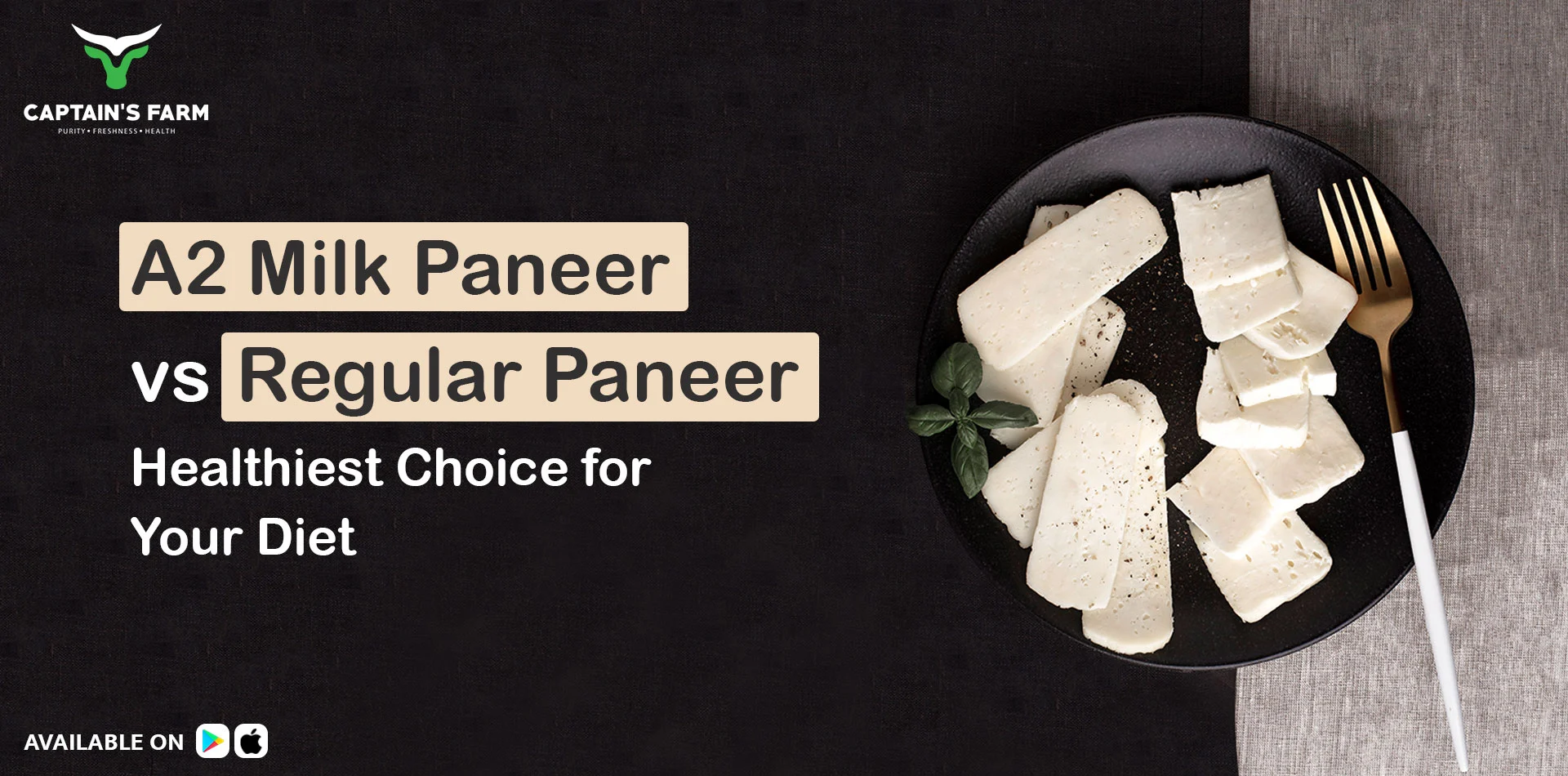Posted by Captain’s Farm

Posted by Captain’s Farm
A2 Milk Paneer VS Regular Paneer: Healthiest Choice for Your Diet
Paneer is one of the most sought-after dairy products, enjoyed by several cultures worldwide. It’s often claimed that paneer contains high proteins, but when it comes to a choice between A2 milk paneer and common paneer, you will probably be in a dilemma about which one you must include in your diet. Let’s break them down and see why A2 milk paneer can be your better choice for some reasons.
What is A2 Milk Paneer?
A2 milk paneer is prepared from milk that contains only the A2 beta-casein protein, found naturally in the milk of certain cows, particularly indigenous breeds. While regular paneer can be made from A1 milk (coming from the conventional cow), in A2 milk, a person only finds the A2 beta-casein protein, said to be easier to digest for many. The difference in protein composition is one of the main reasons why A2 milk and its products, A2 paneer being one, are finding acceptance.
A2 Paneer vs Regular Paneer: Nutritional Comparison
- Protein Content: Both A2 paneer and traditional paneer provide a good amount of proteins required for building muscles and repairing tissues. However, most users of A2 paneer consider it better for individuals with sensitive digestive systems. The A2 protein is easier to digest compared to the A1 protein present in the conventional paneer. As such, one is less likely to suffer from discomfort or bloating once they consume it.
- Calcium: Both A2 and normal paneer are rich in calcium, which is essential for bone health. Calcium helps in the formation and maintenance of healthy bones and teeth. Paneer, therefore, adds nutritious value to your diet. A2 milk paneer might have better calcium absorption as it is more easily digestible.
- Lactose Intolerance: Lactose refers to a sugar present in milk, which lots of people face intolerance toward after consuming dairy products containing lactose. For those mildly lactose intolerant, A2 paneer may be a better option since A2 milk has no A1 beta-casein, which could help it become easier to digest and cause less discomfort for the sensitive to lactose ones. However, it must be noted that A2 paneer is not completely lactose-free, but it could be less of a problem than regular paneer prepared from A1 milk.
- Digestibility: One of the most important differences between A2 milk paneer and regular paneer is how easily the protein digests. In some ways, it is considered to be milder for the stomach, and therefore, easier to digest by those who may have issues with their digestive system or are sensitive to dairy. Regular paneer, made from A1 milk, has been linked to bloating and discomfort in some people.
Does Paneer Have Protein? Does Paneer Contain Lactose?
Yes, paneer is a good source of protein. A portion of paneer contains sufficient proteins for the repair, growth, and performance of the muscles and the whole body in general. Lactose is also present in most paneer, although this can be a problem for lactose intolerant individuals. However, A2 paneer still contains some lactose, which may be more digestible for lactose-sensitive individuals due to the complete absence of the A1 protein.
Is Paneer Easy to Digest?
Paneer digestibility depends on the kind of milk it is made from. Regular paneer made from A1 milk might be a little tough for a lot of people, especially for someone who has a sensitive stomach or has any conditions in his digestive system. A2 milk paneer might be digested more easily and, hence, better alternatives for people experiencing discomfort with regular paneer.
Additional Health Benefits of A2 Milk Paneer
- Beta-Carotene: A2 milk contains beta-carotene, which gives A2 paneer its yellowish appearance. Beta-carotene is the precursor to vitamin A, supporting healthy vision and immune function.
- Boosts Immunity: Regular intake of A2 milk and A2 products may help boost immunity and keep away various infections that may affect the health of an individual.
Conclusion: Which Is the Healthiest Choice for Your Diet?
When choosing between A2 milk paneer and regular paneer, the healthiest option depends on your specific dietary needs and digestive health. A2 paneer is often considered a better choice for those who have difficulty digesting regular dairy products or experience discomfort with the A1 protein. It’s easier to digest, may be more suitable for lactose-intolerant individuals, and offers similar nutritional benefits as regular paneer, including protein and calcium.
For those without any dairy sensitivities, regular paneer can still be a great addition to your diet. However, if you’re looking for a more easily digestible option or want to explore the potential health benefits of A2 milk, A2 paneer may be the best choice for your health.
Key Takeaways:
- A2 paneer is made from A2 milk and is easier to digest than regular paneer made from A1 milk.
- Both types of paneer are rich in protein and calcium.
- A2 paneer is often recommended for people with lactose intolerance or sensitive digestion.
- Regular paneer may still be suitable for people without digestive issues, but A2 paneer offers digestive and immune system benefits.


